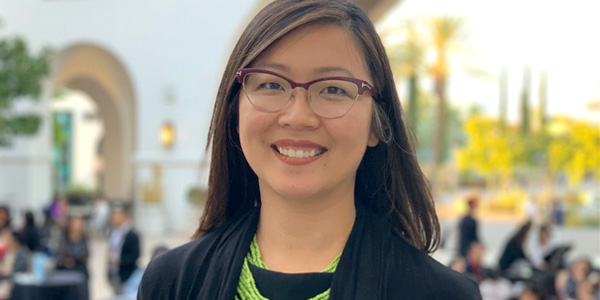
Dr. Nellie Tran remembers being a new faculty member at the University of Massachusetts-Lowell and seeing a Cambodian American student walk down the hallway outside her office, only to stop in her tracks.
“Is this you?” the student asked gesturing to Tran’s name plate?
Tran confirmed that it was.
“I've never seen a professor with this name,” the student marveled. “I get that reaction a lot,” Tran says after recounting the story, “Even here in San Diego where we do have a large Southeast Asian population. … It feels like I wasn't supposed to make it to this level.”
Through her scholarship, teaching and service at San Diego State University, Tran is emphatically challenging assumptions about who fits in academia.
“For me it was this journey of trying to discover what part of my education was real, and fits, and which parts of my education was trying to teach me things that aren’t my truth.”—Dr. Nellie Tran
This year has been a particularly good one for Tran. She became vice president of the Asian American Psychological Association. She earned a promotion to associate professor in the Department of Counseling and School Psychology. And just last month she was honored with the Henry Tomes Award for Exceptional Contributions as an Emerging Leader in Ethnic Minority Psychology from the Council of National Psychology Associations for the Advancement of Ethnic Minority Interests.
“I think this award in particular feels nice because it feels like a nice combination of a lot of the leadership work that I've done and a lot of service work — but also a lot of my scholarship,” said Tran, who was honored for her work on interracial dynamics, particularly efforts to get the Asian American community more involved in the Black Lives Matter movement.
Tran’s scholarship focuses on intervention work to combat subtle forms of bias in academic, workplace and counseling settings. In academia, she studies the biases and microaggressions that teachers and professors of color face from students and administrators, as well as those faced by students in the classroom and university contexts.
“I think about how to disrupt these cycles,” Tran explains. “These are things that happen because of the settings that we're in, not because people are bad. We're in an imperfect system and it's going to flaw, therefore we will flaw. So how do I ensure that those flaws don't manifest into harm unto others?”
Lifting the veil
Tran’s passion for disruption trace back to her childhood in San Diego’s North Park neighborhood as the daughter of Vietnamese Boat People — a name used to describe the approximately 2 million refugees who fled Vietnam in the aftermath of the Vietnam War.As a child, Tran struggled in school, failing second grade and not gaining admission to a 4-year college after graduating high school. Through hard work in community college, she was able to earn a transfer to UCLA.
It was in Westwood where she had something of an awakening. Tran started studying psychology, but she was baffled to find that her own experiences were not reflected in what she was learning. But as she started taking women’s studies and other social justice-oriented courses, the sense of disconnect she felt started to make sense.
“I really felt as though this veil had been lifted,” Tran said. “Here I was doing well at school, but there was all this information telling me that everything I had learned was wrong. For me it was this journey of trying to discover what part of my education was real, and fits, and which parts of my education was trying to teach me things that aren’t my truth.”
As a professor, Tran has been focused on bringing more experiences and representation into academia. She’s also served as a mentor to students from underrepresented groups, many of whom are beginning to see past the veil for the first time.
“I want them to see that what doesn't feel right to them — if I can give them some language or some space to explore it — they don't have to be angry about it,” she said. “They can either do something about it or at least understand why it is. That feels productive.”
'Dr. Tran'
In the world of social justice education, professors often encourage students to address them by their first name as a way of removing the power imbalance. As such, Tran long insisted her students call her Nellie — but she found many of her Asian American students preferred the formal title.“A student once told me that she refused to call me Nellie,” she said. “Her last name was Tran, as well. She said, ‘I need to hear Dr. Tran.’”
As a result, “Nellie” is now optional.
“It wasn't for me anymore,” Tran said. “It was for her.”
